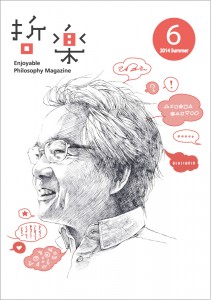
 In 31 March 2015, the latest vol.6 has been released from Kindle stores! As a special issue in this volume, the editorial team discussed about a well-known Japanese philosopher, Hitoshi Nagai and the influence of his philosophy on the wide range of practice fields including psychiatry, Buddhism, and education.
In 31 March 2015, the latest vol.6 has been released from Kindle stores! As a special issue in this volume, the editorial team discussed about a well-known Japanese philosopher, Hitoshi Nagai and the influence of his philosophy on the wide range of practice fields including psychiatry, Buddhism, and education.
Please check out the nearest Kindle store in the below list.
■Japan: Amazon.co.jp ■USA: Amazon.com ■India: Amazon.in
■UK: Amazon.uk ■Germany: Amazon.de ■France: Amazon.fr
In 2014, a philosophy magazine has been released as a Kindle edition from Japan to the world. This is the first Japanese philosophy magazine for general public, which young philosophers collaborated to write accessible articles especially to high school students.
This is our first attempt to focus on a particular philosopher since we started the Japanese Enjoyable Philosophy as a “web magazine dedicated to philosophical issues and the lives of philosophers” in 2010. The titles that we featured in previous issues were “Boys, do Philosophy!”, “Philosophy for Nature and Life”, “Thoughts on Transplants from Brain-dead Children”, and “Post 3.11 Science Communication”. You will see that we have examined current affairs issues of the time through some philosophical viewpoints. Now, the reason why we decided to release the special issue “Philosopher, Hitoshi Nagai” was not because he was related to the current affairs issues at this time, but because we are interested in the relationship between his philosophy and his character.
Since I was learning philosophy at the university where Nagai was teaching, there was one thing that I could not figure out. It was really difficult to make a good connection between Nagai’s high capacity for empathy and his philosophical themes throughout all his books where he expounds his “philosophy of I!”, which questions why this ‘I’ is only myself.
What is his high capacity for empathy? Here is an episode that I heard from his family. One time when their daughter was a small baby, Nagai’s wife came home and saw that her husband made two handles for a baby bottle by bending the wire of a hanger, and the baby was drinking a bottle of milk by herself, while her father was absorbed in reading a book. I know that any children and even any dogs usually get attached to him very easily. He, as a professor for university students, usually understands precisely what a student is trying to say, and replies to him/her quickly and appropriately. If his sympathetic mind is applicable only for discussion, it can be explained by his high level of rationality, and I can understand that this is based on his experience of philosophical research and education. His sympathetic mind, however, is also applicable for babies and dogs, so I wonder where that is coming from. On the other hand, Nagai’s “philosophy of I!”, which expounds that there is only one who can refer to as “this I”, which is explicitly different from how others exist, is a consistent theme throughout his works. I have wanted to ask him some day how these two opposing characteristics coexist in one person.
While he is involved in philosophical discussions, he can quickly “role-play” as others, and “responds” accordingly, exactly like a ping-pong player. When he was a child, he actually played baseball and basketball, participated in a mountain climbing club, and even drama club too! Despite of his physical capability and communication skill, his philosophical themes do not include something like aikido or intersubjectivity. They developed from criticism of Wataru Hiromatsu who is a famous Japanese philosopher who proposed “common subjectivity”, and Maurice Merleau-Ponty who developed a theory of the human body.
I have had the privilege of meeting many philosophers, but I have never seen such a mysterious convination. From the spring of 2014, we have discussed about this one Japanese philosopher and the influence of his philosophy.